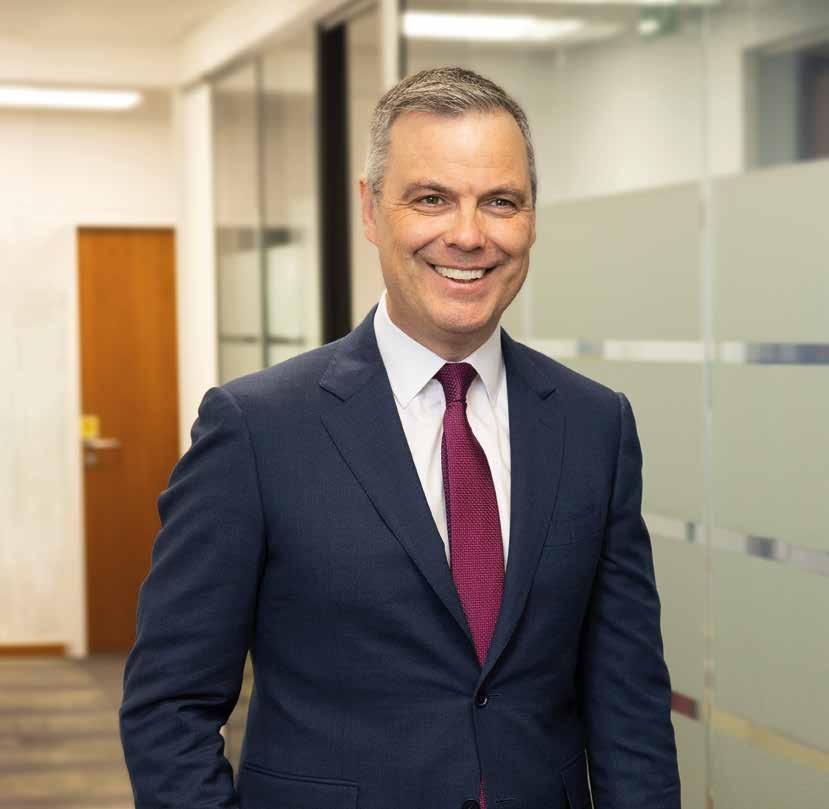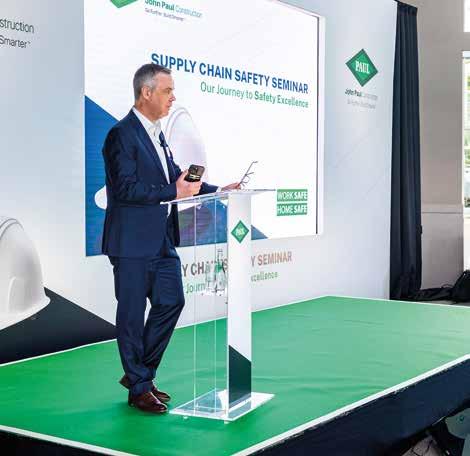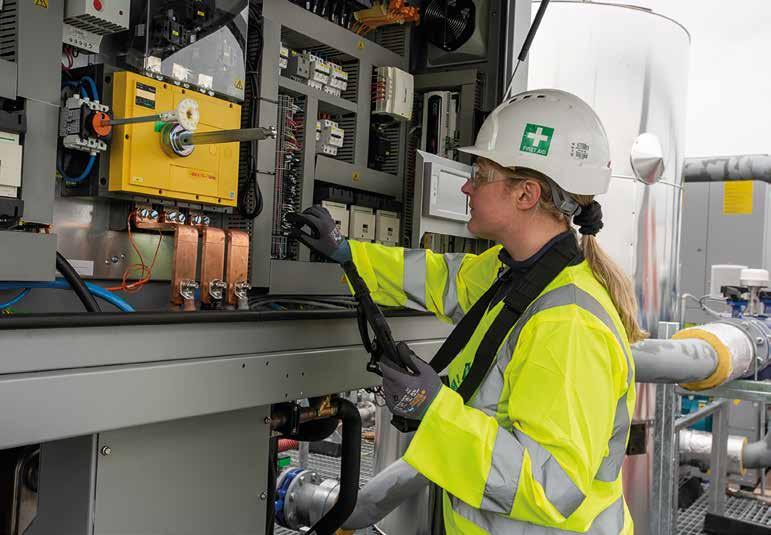
5 minute read
Going beyond the numbers
At John Paul Construction, diversity and diversification are proving to be key drivers of growth, innovation, and resilience. Liam Kenny, Managing Director. John Paul Construction, discusses how these factors contributed to the contractor’s impressive performance in 2022.
To understand the real successes of 2022 for John Paul Construction, you need to go beyond the numbers, at least, according to managing director Liam Kenny, and it’s hard to disagree.
Advertisement
That’s not to say the numbers aren’t healthy; quite the opposite. With a global turnover of €605m, of which €507m was generated in Ireland, the company performed strongly in 2022, delivering high-quality projects across Ireland and via its offices in the UK, the Netherlands and the Middle East. Currently, John Paul Construction is also expanding into Germany via an outpost in Frankfurt.
The company’s pipeline of projects is diverse and extensive, covering everything from data centres and pharma/life sciences, to commercial, civil, residential and advanced technology. That the company is expanding is clear, not least in terms of employee numbers, which now stand at over 500-strong today.
For Liam Kenny, though, the real success story goes deeper.
From Generalist To Specialist
At the root of it all is a fundamental transformation in how the company thinks and works. In what was a strategic move, John Paul Construction has transitioned in recent years from being a traditional main contractor to being a highly agile operator with specialist expertise in high-tech, highgrowth areas such as advanced technology, life sciences and data centres. The company has also opened offices abroad, which have secured key projects in these sectors, including a semiconductor manufacturing facility in Oxford, UK, which is now underway for a global client in the advanced technology sector.


This strategy of sectoral and geographical diversification — and of being a specialist as much as a generalist — is paying dividends, not least in terms of margin, but it is also protecting the company from the worst effects of cyclical market risks. Last year, these included tail-end fallout from the Covid-19 pandemic, which had upended supply chains, the conflict in Ukraine, and double-digit inflation. Brexit, meanwhile, “is not as big a problem as it was,” according to Liam Kenny “We’ve adapted and moved on.”
It’s clear that the company’s approach to risk management is working well. “It’s a team effort,” admits Liam. “In the current climate, you can’t take anything for granted, but our people are doing an excellent job of identifying, managing and mitigating risks.”
EQUALITY, DIVERSITY AND INCLUSION
This level of foresight is evident elsewhere at John Paul Construction, particularly in its work on Equality, Diversity and Inclusion EDI.
In an industry traditionally dominated by men, particularly in the trades, it’s clear that greater inclusion has to start with more women. And whilst Liam is quick to acknowledge that systemic change around gender is “a long game”, change is beginning to happen, albeit slowly, in this area, with women now comprising 18% of the company’s workforce, which is increasing year on year.
Liam Kenny is astute enough to recognise that there’s no room for complacency.
“We’d love more female engineers, but they’re just not coming through the college system.” The solution? Make women in the industry more visible. “You need to build awareness - and curiosity - early,” Liam explains. To build on this, John Paul Construction run an outreach programme in girls’ secondary schools. Schools situated near their projects afford the company the opportunity to invite students to see for themselves what it’s like to work in the industry, and although it is a small initiative, hopefully, it can make a lasting impact.
Over recent years, there has been an increased female presence at leadership level, which has contributed greatly to the company’s push for a more inclusive workforce, including being responsible last year for setting up a dedicated EDI Committee to lead change throughout the organisation. According to Liam Kenny, “We have a lot of nationalities here — 27 and counting — but we know that real inclusion goes wider and deeper.”
These efforts are not going unnoticed. In 2022, the company was rewarded with Silver accreditation in the Investors in Diversity scheme, recognising companies with a holistic approach to building a more inclusive, equitable and diverse organisation.
“Securing that accreditation was fantastic,” he comments. “Diversity is so important. It’s not just that different ways of thinking drive innovation. There’s a strong human case, too; it’s better for everyone all-round.”
Safety
Ask Liam Kenny what the company’s greatest achievement was in 2022, and he doesn’t hesitate, “It has to be the reduction in both our lost-time accident rate and the overall accident frequency rate.”
And to what does he attribute this progress? “We apply our values of excellence and teamwork as relentlessly to safety as we do to our work for clients,” Liam states. “Safety is everyone’s job here.”
He doesn’t just mean physical safety, either. As well as running health and wellbeing campaigns, John Paul Construction has a range of mental health initiatives in place. Examples include an employee assistance programme, as well as the free mental health support it promotes through its charity partner, The Lighthouse Club. “I’m happy to say that the days of employers seeing mental health as a private issue are over,” Liam explains. “We don’t want anyone to suffer, so we keep the channels open, so people feel okay asking for help; no one should be alone in a crisis.”
Sustainability
Liam Kenny is nothing if not ambitious for the company’s sustainability agenda. In recent years it committed to a comprehensive net-zero roadmap, which includes clear goals to take it up to 2030. Delivery of those goals is now supported by a number of new governance structures, including a Sustainability sub-committee formed in 2021.
Last year, the company used the results of two key surveys - on sustainability and materiality - to establish baselines for energy usage, emissions, waste, water usage and other indicators.
“You have to know where to improve,” explains Liam. “These baselines are so useful, but we’ve also been expanding our EV fleet and trialling HVO fuel. Only by trying new things and measuring their success or failure will we understand where to make a real difference.”
TECHNOLOGY & INNOVATION
Trying new things is second nature at John Paul Construction, which is known for embracing new technologies that help deliver projects quickly, safely and efficiently, particularly off-site construction.

Last year, for example, modular construction was instrumental in the delivery of a large bio-science facility in Co Meath, and of Walter Scott House, the new Garda Security & Crime Operations Centre in Dublin - housing several Garda Bureaus and operational units - which features a number of off-site construction innovations.
In 2022 the company further developed its virtual design and construction (VDC) offering by making mobile applications and BIM tools more widely available to people across its many sites, resulting in increased quality standards and productivity.
Most recently, it adopted Procore, a cloud-based project documentation and field management tool, and implemented its new enterprise resource planning platform, with greater connection to plant and material procurement to better control and monitor costs.
Housing Challenges
“Right now,” asserts Liam Kenny, “my focus is the residential sector. There’s so much capacity in the sector, but the wheels are too slow to move.”
He’s not wrong. Today’s landscape is very different to that of a few years ago. Changes in the macroeconomic environment, particularly rising interest rates and high inflation, have planted doubt in some investors’ minds about the viability of financing and operating residential schemes in the longer term.
But what is the solution? “There are some very good ideas out there, and the government has a large part to play through approved housing bodies and the like, but as a whole, it’s just not happening fast enough,” acknowledges Liam. “And planning is not the problem. There’s planning in place for thousands of units, but the whole process has to move quicker if we’re to get them off the ground.”
One thing Liam Kenny has no doubt about, however, is the calibre of talent and residential expertise available in John Paul Construction.
“There’s such a high level of skill and experience. It’s taken the industry many years and much investment to build that up. Let’s use it before we lose it.”
You can only hope his invitation doesn’t fall on deaf ears.










